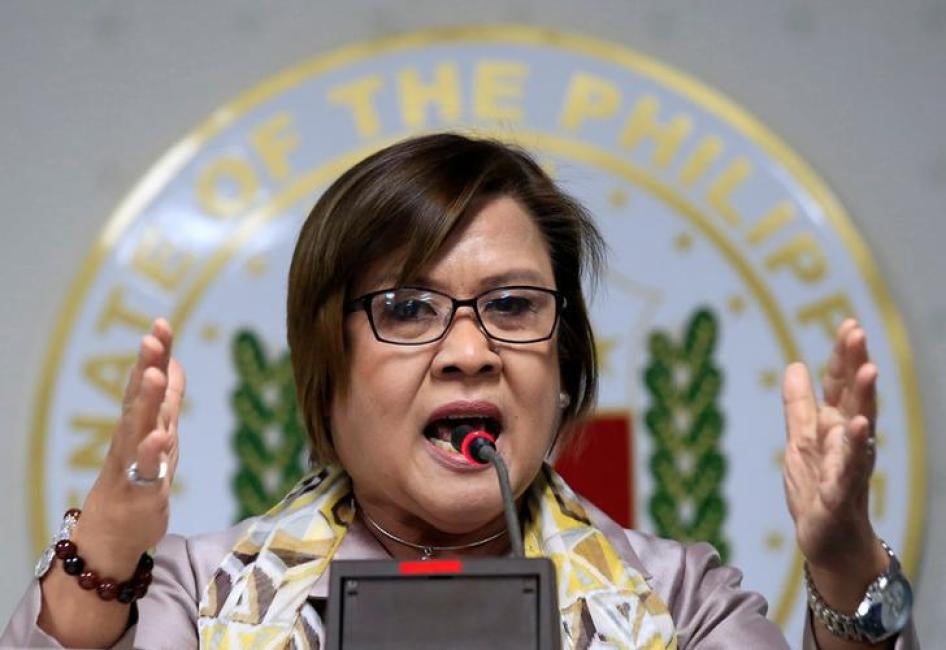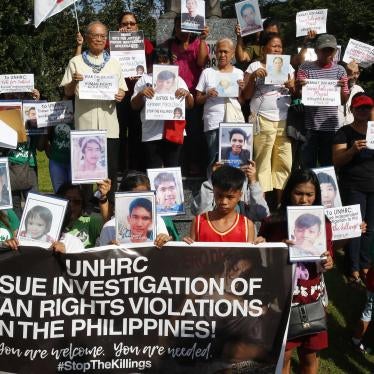(New York) – Philippine authorities should immediately drop politically motivated charges against one of the few lawmakers openly critical of President Rodrigo Duterte’s “war on drugs,” which has left more than 7,000 people dead, Human Rights Watch said today. Senator Leila de Lima, a former secretary of justice, is expected to be arrested and taken into custody within days.
Philippine Justice Secretary Vitaliano Aguirre II announced on February 17, 2017 that charges had been filed against de Lima, her driver and several unnamed individuals for alleged violations of section 5 of the Dangerous Drugs Act, which prohibits the “sale, trading, administration, dispensation, delivery, distribution and transportation of illegal drugs.” If convicted, de Lima faces between 12 years to life in prison. Under the Philippines Constitution, legislators only enjoy privilege from arrest for crimes punishable by fewer than 6 years’ imprisonment.
“The prosecution of Senator Leila de Lima is an act of political vindictiveness that debases the rule of law in the Philippines,” said Phelim Kine, deputy Asia director. “The Duterte administration seems intent on using the courts to punish prominent critics of its murderous ‘war on drugs.’”
The charges hinge on testimony by several detainees at Manila’s New Bilibid Prison who allege de Lima accepted money from “drug lords” and facilitated a drug-trading operation while she was justice secretary under former President Benigno Aquino III. An official probe subsequently found that Aguirre, as justice secretary, had personally authorized perks for those inmates including “use of electronic gadgets, smart television sets, air-conditioning units, internet, [and] cellular phones” as an apparent reward for their testimony. Aguirre denied both that allegation and that the de Lima prosecution was politically motivated. “This is not the product of politics,” he stated. “This is the product of drug trading.”
De Lima’s history of investigations into Duterte’s alleged involvement in extrajudicial killings dates to 2012, when as chairperson of the official Commission on Human Rights, she initiated a probe of Duterte’s alleged ties to the “Davao Death Squad” during his two-decade tenure as mayor of Davao City in southern Mindanao. That inquiry resulted in an official recommendation that the Office of the Ombudsman investigate Duterte’s “possible administrative and criminal liability” in connection to the Davao death squad killings. The ombudsman office has yet to follow through on the recommendation.
The prosecution of de Lima follows a relentless government campaign of harassment and intimidation against her in response to her outspoken criticism of Duterte’s “war on drugs” and her demands for accountability for the thousands of Filipinos killed by police in that campaign since July 1, 2016. In August, de Lima convened hearings of the Senate Committee on Justice and Human Rights, which she chaired, into the killings of thousands of alleged drug users and drug dealers after Duterte took office on June 30. The hearings exposed her to a torrent of harassment and intimidation from Duterte and other government officials.
The politically motivated case against de Lima shows how Duterte‘s ‘war on drugs’ threatens not only the thousands of people targeted, but the criminal justice and political systems.
Phelim Kine
Deputy Asia Director
Days after the hearings began, Duterte launched the first of a series of attacks on de Lima’s personal integrity by claiming the senator was having an affair with her married driver. Duterte subsequently claimed to possess several “sex tapes” of de Lima with her driver and publicly referred to her as an “X-rated actress.” That same month, Duterte lashed out at de Lima’s pursuit of accountability for drug war killings by telling a crowd of supporters that de Lima should commit suicide, saying, “If I were de Lima, ladies and gentlemen, I’ll hang myself.” Over the past six months Duterte has continued his personal attacks against de Lima, referring to her “odious character” and repeatedly asserting that she will “rot in jail.”
The Duterte administration’s attacks on de Lima intensified after an admitted former “hit man,” Edgar Matobato, testified at a Senate hearing on September 15 about the alleged killings of about 1,000 people in Davao City during Duterte’s mayoralty. Matobato, a member of the “Davao City Death Squad” from 1988 to 2003, said he himself killed about 50 people under direct orders from then-Mayor Duterte. “Our job was to kill criminals, rapists, [drug] pushers and snatchers,” Matobato testified. “We killed people almost on a daily basis.” He described seeing Duterte “[empty] two Uzi magazines” at a National Bureau of Investigation official in 1993.
Pro-Duterte senators subsequently accused de Lima of being “biased” against the president and ousted her as the chair of the justice committee in an apparent reprisal for her inquiry. Those same senators publicly disclosed de Lima’s personal mobile phone number, resulting in her receiving thousands of threatening text messages from anonymous sources.
“The politically motivated case against de Lima shows how Duterte‘s ‘war on drugs’ threatens not only the thousands of people targeted, but the criminal justice and political systems,” Kine said. “It’s more important than ever that concerned lawmakers and foreign governments step up to denounce the Duterte administration’s disregard for basic human rights.”








